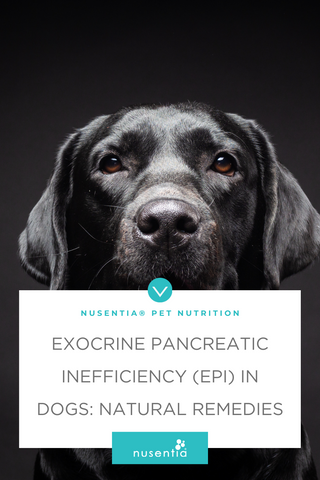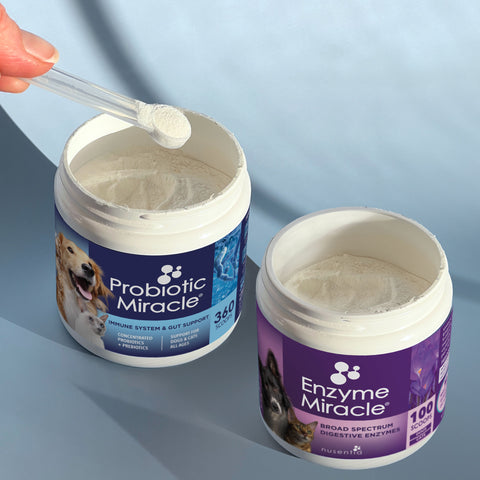Experiencing unexplained weight loss and stomach issues in your dog could be signs of Exocrine Pancreatic Insufficiency (EPI), a condition more prevalent than many pet owners realize. Over the past decade, awareness of EPI in dogs has significantly increased, highlighting the importance of recognizing its symptoms early. Although genetics often play a key role in the development of EPI, there's promising news for those seeking to manage their dog's condition. By focusing on natural care and nutrition, pet owners have the potential to greatly enhance their dog's quality of life, offering hope for a healthier, more vibrant future. This comprehensive guide delves into the essential knowledge about EPI, providing insights and actionable advice for those looking to support their pets through natural solutions.

Exocrine pancreatic insufficiency (EPI)
EPI is the inability to properly digest food due to a lack of digestive enzymes made by the pancreas. Loss of digestive enzymes leads to maldigestion and malabsorption of nutrients. This is not the same as pancreatitis, which is basically inflammation of the pancreas. Rather, EPI is caused by a progressive loss of the pancreatic cells that make digestive enzymes. Dogs and cats can both suffer from EPI, though they usually have different pathologies, and EPI is much less common in cats. In dogs, EPI is most commonly caused by pancreatic acinar atrophy.
In cats, the primary cause is chronic pancreatitis. Beyond genetics, which researchers believe plays a large role, the root cause can also traced to poor diet or health, which ultimately causes a burden on pancreatic function.
Which breeds are most at risk for EPI?
In dogs, EPI is most common in young German Shepherd Dogs (GSD), which make up about one-half to two-thirds of all cases. Other breeds that seem to be predisposed to EPI include terrier breeds, Cavalier King Charles Spaniels, Chihuahuas, Chow Chows, and Picardien Shepherd.
Symptoms of exocrine pancreatic insufficiency
- Weight loss
- Poor coat quality
- Gas
- Increased appetite
- Diarrhea
- Change in feces (to yellow-gray color and oily)
The one, two punch to knock out EPI through nutrition
1. Digestive Enzyme Supplementation
Most dogs and cats with EPI can be successfully treated by dietary supplementation with pancreatic enzymes. Most experts on the subject will tell you that enzyme powders are more effective than tablets, capsules, and especially enteric-coated products.
Nusentia's® Enzyme Miracle® comes in powder form and delivers all the enzymes that dogs and cats need for digestion of proteins, carbohydrates and fats.
In about 10% of dogs that have EPI, enzyme supplementation can cause some oral bleeding. If this happens, you (a) can moisten the food and powder, or (b) lower the dose. This will stop the problem.
2. Probiotic Supplementation
One of the other problems in pets with EPI is that their gut health can suffer. In dogs with EPI, they often have concurrent small intestinal bacterial overgrowth (SBO), while cats with Exocrine Pancreatic Insufficiency often have concurrent inflammatory bowel disease (IBD). Conventional treatment would be to have antibiotics, but in fact both of these areas can be addressed naturally and effectively by using therapeutic probiotics. These healthy bacteria serve to counteract SBO by being competitive and overrunning the bad bacteria, which ultimately leads to their die-off. In IBD, there are specific species of probiotics that have anti-inflammatory effects.
Nusentia's® Probiotic Miracle® is specifically designed for pets, and contains a scientific blend of six strains which have been demonstrated to restore proper gut function.
These actions restore balance to the gut in favor of health. While every dog is different, the results may vary, and make sure you consult with your vet. And while you're at it, talk to your vet about adding B12 and a low-fiber diet. These nutritional interventions can address EPI effectively and help lead your pet back to health.
Nusentia® offers a bundle of probiotics and enzymes with the Miracle Pack®
Customer Testimonial:
(excerpt from Amazon) "I have a Lhasa Apso that is 10 years old and was recently diagnosed with diabetes. I was instructed by her veterinarian that I would have to change her diet completely... As I struggled to get her blood sugar under control with insulin her weight began to drop slowly over time as she became more and more finicky with her new diet. Not only was her weight dropping and she constantly going through bouts of diarrhea but her overall appearance was getting worse, her coat was dry and rough to the touch. I started researching her symptoms online and came across what I believe she may have been suffering from for a long time even before the diabetes. I believe she has EPI (Exocrine Pancreatic Insufficiency)... It was at this time I purchased Nusentia's Enzyme Miracle for dogs and what a difference it has made for my dog. Almost immediately she started eating better which allowed me to better control her blood sugar with insulin. Within a couple weeks she had started to gain some of her weight back and her coat is nice and soft again just like when she was a younger dog. As for the bouts of diarrhea she has not had any for several months now and I no longer have to give her the oral medications that the veterinarian would prescribe for the bouts of diarrhea. This product has truly been a miracle product for my dog and I. I would highly recommend this product to anyone who wants to help their dog be as healthy as possible throughout their life."
Conclusion
For pet owners navigating the complexities of conditions like Exocrine Pancreatic Insufficiency (EPI), understanding the role of nutritional supplements in managing your pet's health is paramount. However, this journey should not be embarked upon without the guidance of a trusted veterinarian. A vet's expertise complements the use of supplements by ensuring they align with your pet’s specific health needs and overall care strategy.
Whether you're exploring enzyme supplementation with Nusentia's® Enzyme Miracle® or bolstering gut health with Probiotic Miracle®, remember that these steps are part of a larger, vet-approved plan aimed at giving your pet a happier, healthier life. Consultation with a veterinarian not only validates your choice of supplements but also integrates it into a comprehensive approach to tackle EPI effectively.
References
Westermarck E, Wiberg M (2003). "Exocrine pancreatic insufficiency in dogs". Vet Clin North Am Small Anim Pract 33 (5): 116579, viiiix. doi:10.1016/S0195-5616(03)00057-3. PMID 14552166.
Clark L, Wahl J, Steiner J, Zhou W, Ji W, Famula T, Williams D, Murphy K (2005). "Linkage analysis and gene expression profile of pancreatic acinar atrophy in the German Shepherd Dog". Mamm Genome 16 (12): 95562. doi:10.1007/s00335-005-0076-1. PMID 16341675.
Wiberg M, Saari S, Westermarck E (1999). "Exocrine pancreatic atrophy in German Shepherd Dogs and Rough-coated Collies: an end result of lymphocytic pancreatitis". Vet Pathol 36 (6): 53041. doi:10.1354/vp.36-6-530. PMID 10568434.
Rallis, Timoleon S.; Adamama-Moraitou, K. (2004). "Exocrine Pancreatic Insufficiency in Dogs and Cats: An Update". Proceedings of the 29th World Congress of the World Small Animal Veterinary Association. Retrieved 2007-02-24.
For natural, trusted pet health supplements with proven formulas to improve your furry friend's overall health, visit Nusentia, a brand trusted by veterinarians and pet parents alike since 2008.




